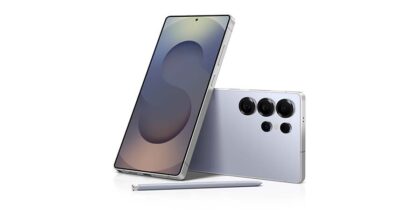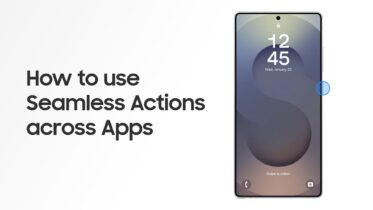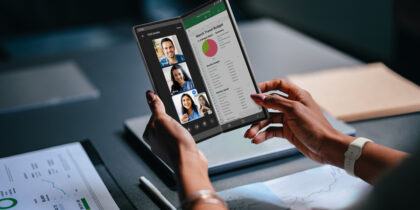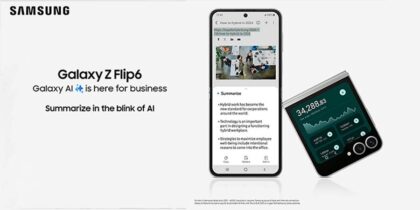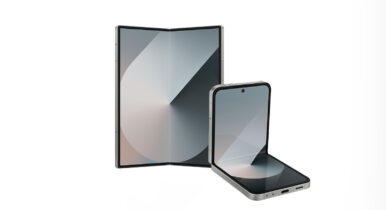One of the things that’s great about my job is being able to talk to so many innovative enterprise customers, hear what they’re doing with our technology and — more importantly — what we need to do to meet their future needs.
Recently, I’ve been getting two very strong messages, again and again:
Employees wish they could just use their phone for everything — they already can for over half of their work. At the same time, IT managers would also like to cut back on the number of devices they have to procure, manage and support, both to simplify their jobs and to cut costs.
“Mobile workforce” isn’t just a buzzword, it’s reality. Having a dedicated desk is growing less and less important for productivity, as more employees travel, work remotely and hot desk.
Conversations about more modern mobility and traditional device convergence have been going on for decades in an effort to remove redundancy, but recently something important has happened: the technology and economics of mobility have caught up with these ideas. In 2018, the smartphone can truly both fit in your pocket and deliver the computing power that rivals standard laptops or desktop PCs.
The final piece of this equation: Samsung DeX.
Why We Built DeX
The simple answer for why we built DeX is that we wanted to provide the tools for organizations to take the final step in realizing the mobile-only workforce. Smartphones have the computing power, the speed, the storage and connectivity, and — as discussed above — the need is there. DeX is the missing link, the platform that allows your smartphone to offer a true desktop experience and environment, while utilizing any screen, mouse and keyboard available to you.
When we designed DeX, we knew each business would have unique requirements, and we kept that in mind every step of the way — and continue to do so as we evolve the platform. Today, DeX runs on our Galaxy S8/S8+, S9/S9+, Note8 and now the new Note9.
Embrace the Next Mobile Economy
Get this free report on how to realize the potential of mobile in your business. Download Now
In the initial iteration of DeX launched in early 2017, users required a specific accessory, the DeX Station, to launch DeX and connect your smartphone to your monitor, keyboard and mouse. With the launch of the Note9, all you need to use DeX is the Samsung HDMI adaptor. That really streamlines access — removing as much friction as possible for users so they have a buttery smooth experience from initial connection, interaction on-screen to disconnecting.
This evolution should make one thing clear: DeX is not an accessory; it’s a mobile-powered computing platform.
Securing DeX
One of the key concerns we hear when we talk with IT stakeholders is over security. Today, they’re caught in a bit of a bind with the standard workstation, as laptops and desktops can run the best firewalls available, but have limited protections against human errors — such as letting non-employees use them in off hours, jumping on unprotected Wi-Fi, or leaving them unlocked in coffee shops. On the other hand, smartphones have evolved to protect against threats outside the workplace, with advanced mobile device management controls, biometric authentication and hardware-level security.
Since DeX is simply an extension of your Galaxy smartphone, it leverages all of the R&D we have invested over the past five years in building out Samsung’s Knox security and management capabilities. Knox provides defense-grade mobile security for your mobile devices, and now your mobile-powered desktop experience too. This hardware-level security gives your teams the freedom to work and play — while mitigating the risk of human errors as well as cyberattacks.
Finally, if you have some Windows applications that you can’t live without, DeX also fully supports VDI solutions: Citrix Receiver, VMware Horizon and Amazon WorkSpaces are all optimized and run beautifully with DeX.
Moving to Mobile-Only
DeX is still relatively new, but we’ve already seen tremendous interest and early adoption across a range of industries — even those that are heavily regulated.
In combination with partners, we’re exploring opportunities to enable Federal government agencies, including DoD, to enhance overall security by transitioning to a single device for each user: a Galaxy smartphone with Samsung DeX. The power of DeX combined with Route1’s MobiKEY provides agency personnel a mobile secure remote access solution.
On a more local scale, most police departments equip their squad cars with rugged laptops to give officers access to computer-aided dispatch and information systems. But police officers don’t stay in their cars all day; they’re out in the field — and they’re using their smartphones when they’re away from the car. That’s why we’re working with several police departments to replace their in-car computers with Samsung DeX. Officers no longer have to jump back and forth between two or more devices; they’ve got one device that functions smoothly and securely in the field, the cruiser and the department, so they can move quickly without worrying about critical information and alerts falling through the cracks.
At the same time, smaller private companies can see just as much immediate benefit from adopting the mobile-powered desktop experience. Just look at Tamarack Aerospace, which has only 25 employees, but used a combination of DeX and cloud-based Desktop-as-a-Service to replace desktops with Galaxy smartphones.
I hope you get a chance to try Samsung DeX in your own organization. You’ll find that Samsung DeX is not just a clever accessory. It’s an always-on computing platform tailor-made for the modern, mobile workforce.
Learn how the Note9 can power mobility, power productivity and power your business.

